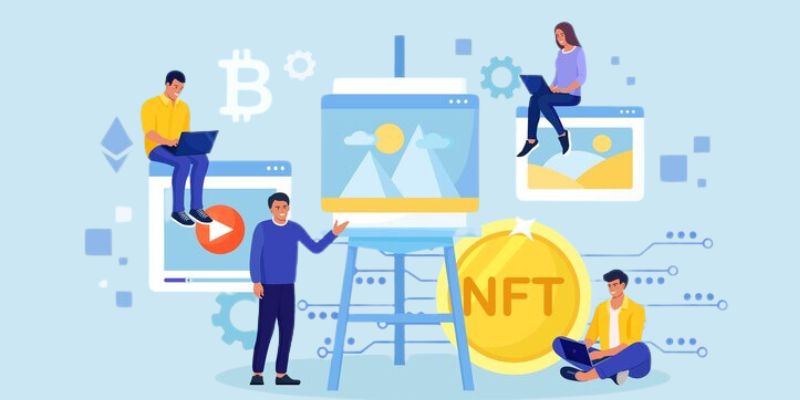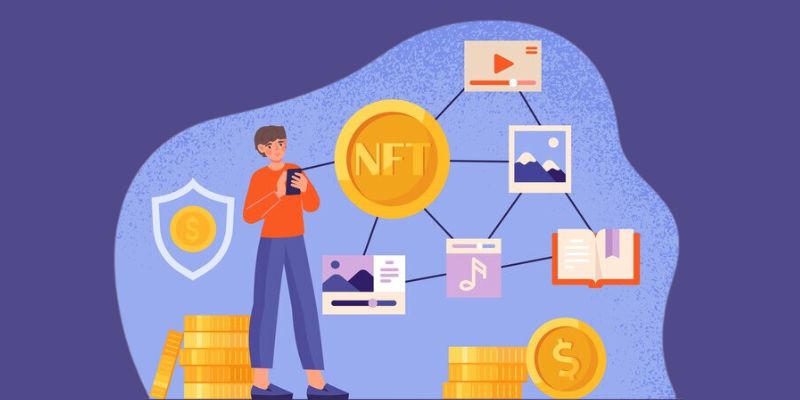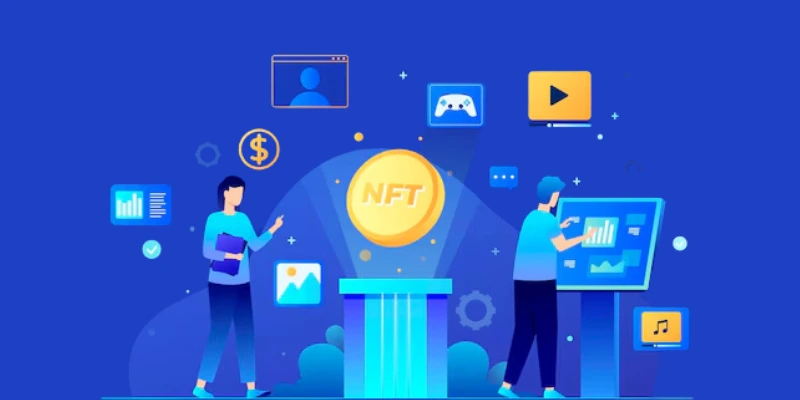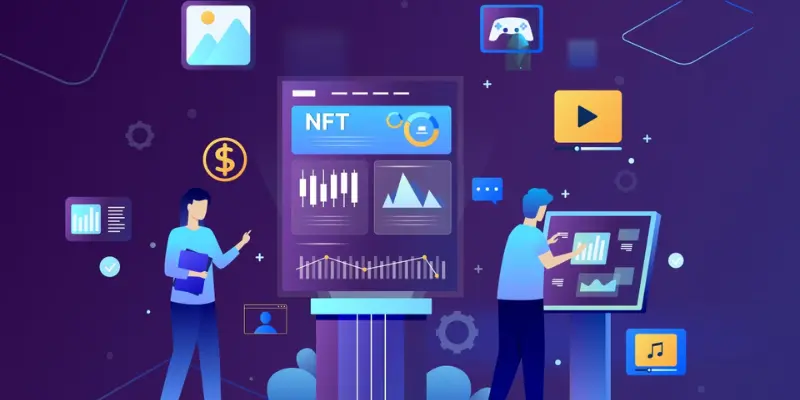Non-fungible tokens (also known as non-fungible) have been trending for some time now and are taking the crypto industry to the next level. In simple terms, they are digital assets like traditional assets; however, they are distinguished by a unique code stored in the blockchain.
They're also known as digital certificates, which are used to identify ownership of objects or assets representing a variety of items, such as videos, paintings, music, and more. Certificate templates can create and issue certificates that signify the ownership or authenticity of different things or assets.
The extensive use of NFT technology benefits both the creators of the content and the markets in which NFT content is stored. For instance, OpenSea is now the most popular place for high revenue, which shows that every business affected by NFT is transforming into gold. The question that comes to your brain is, what makes the NFT marketplace the primary source of profit greater than the direct making or selling of NFT?
We'll go deeper knowing that the NFT marketplace development costs are becoming popular on the internet.
In this blog, we'll examine the costs of establishing an NFT marketplace and what entrepreneurs must know when they enter the crypto world by launching the most effective NFT marketplace.
Also Read: NFT Marketplace Development: The Future of Digital Ownership For 2024
What Is an NFT Marketplace?
The NFT marketplace can be defined as a platform selling non-fungible tokens from numerous creators and owners. For instance, OpenSea, the first and largest NFT marketplace development platform, shows individual images and collections. Users can also create their own NFT collection or one NFT. Additionally, they can purchase and sell digital assets to collectibles or for further reselling. The marketplace seller gets commissions from the launch of collections and sales.
NFT Marketplaces Trends
The NFT Marketplace Development industry is expanding by 2021. According to Block Research, the trading volume of NFTs exceeded $13 billion. The volume has increased nearly 400 times over the previous $33 million in 2020.
The statistics show that many people are keen to create and create the NFT marketplace development project, and there's room in the market for a new way to host and showcase their collections. In an NFT platform, the artists and fans seek suitable conditions, a convenient interface, and the chance to expand and be competitive. If your marketplace meets their needs, the people will pick it as the best place to keep the mint. As the owner, you will gain sales and marketing from the initial launch. On this basis, it is possible to say that creating an NFT marketplace is an exciting idea today.
The growing NFT marketplace development services offers many opportunities for experts to be involved in developing or trading NFTs. Blockchain technology today provides customers with the security of their digital assets, which boosts trust and interest. Furthermore, it's safe and secure for you to keep your coins in an updated cryptocurrency wallet. This is the reason NFT platform developers are able to successfully and profitably supply in-demand solutions for generating exchange, issuing, or issuing non-fungible tokens.
Must Read: Digital Assets With Best NFT Marketplace Development Company
Essential Features of A Successful NFT Marketplace

When planning for non-fungible tokens, businesses should note that there are back-end and front-end challenges. For instance, an intuitive, user-friendly front end will benefit both buyers and artists and make their searches easy.
In contrast, the back-end resources need to function safely and reliably with blockchains and NFTs. To ensure the smooth development of the platform, you can hire an NFT token development company, blockchain software development professionals have shed light on the key features of a well-functioning NFT marketplace.
Storefront
NFT Marketplace websites look similar to e-commerce websites. They also require a storefront to store the necessary information. The website administrator determines the information that will be displayed for each file, such as the owner's details of prices, bids, and more.
Search Functionality
Your NFT marketplace must have tags and management capabilities, which make it simpler for buyers to find products that they can purchase from this NFT platform. This function is part of the NFT marketplace and should usually include price history, the asset owner's price history, past bids, and much more.
Generate Listing
This fantastic NFT marketplace development feature is focused on sellers. It allows users to create listings in which they can input their essential NFT information. The features are specially designed for sellers.
Auction & Buy
Each NFT marketplace development platform should include an effective NFT buying system. This is an essential component of NFT marketplace development services. This is where you let users add the amount of bud, expiration date, as well as watchlist details that indicate the status of bids.
Trending Collections
Many NFT tokens can fetch a high selling price if displayed correctly in the " Trending collections " section. That's why it's essential to incorporate a collection trending to an NFT marketplace that provides valuable data such as average price, seller's name, and the total supply of Crypto collectibles.
Wallet
Every NFT market participant will require a wallet to transfer, receive, and store Cryptocurrencies, also known as NFTs. Therefore, your NFT marketplace development company could create an in-app wallet and integrate third-party accounts into the marketplace application. This will enhance the user's experience and make your app more reliable and secure.
Instant Notifications
As with any other mobile app development, your marketplace app should include an instant notification system that informs users via push notifications and emails. Information about upcoming launches of collectibles, non-fungible token auctions, and more will be sent out via immediate notifications.
Multiple Payment Integration
Everyone prefers using another payment method. Right? That's why it's essential to have multiple payment integrations that allow users to pay using any source, including debit cards, credit accounts, debit and much more. Incorporating this feature will boost the value of your NFT marketplace application.
Support & Assistance
If you're creating an NFT marketplace, Solana, or a polygon NFT marketing, you will only be successful and grow when it addresses user concerns promptly.
Users' Reviews & Ratings
Reviews and ratings can be valuable assets for sellers and buyers. People are more likely to choose those with a solid reputation, so incorporating this feature is essential for each NFT market application.
All features mentioned in the above list will be a key aspect of the performance of the NFT marketplace. If you're not creating an application independently but instead seeking assistance from a top nft marketplace development company, ask them to integrate these excellent features. Additionally, each feature contributes to the expense of developing the NFT market, so be cautious when adding features.
Read About: NFT Marketplace Development: Everything You Need to Know About
How to Create an NFT Marketplace in 8 Steps
Creating your own NFT platform could be lucrative. However, it requires meticulous planning and execution. Here are eight easy steps to creating the perfect NFT Marketplace Development.
Define the Concept and Niche
The first step in establishing an NFT market is to settle on the basic idea. Do you wish to concentrate on a specific file, such as sports, art, or gaming? Or would you prefer an all-encompassing market for all types of NFTs? Determining your business's goals in the beginning is vital. Picking a niche is an excellent way to create a targeted user base. You can also create features specifically for the niche. Study competing platforms to better understand the market.
Find a Team to Create an NFT Marketplace
To build a booming market, you need skills. This includes development, design marketing, and much more. You should find a qualified team if you do not have these capabilities. Find experts knowledgeable about the blockchain industry and smart contracts or NFT platforms. Employ product designers to design an easy user experience. There may be a need for community managers and marketing specialists as well. Finding the right people is the most essential factor to be successful.
Deciding on the Feature List
Which features would you need to see on your platform? Basic features might include accounts for users for browsing NFTs, purchasing, bidding, and selling. The more advanced options include auctions, bundles of NFTs, or renting. Other options include social sharing, such as following creators, ratings, and royalty payments.
Choosing a Monetization Strategy
How do you make money through the market? The most popular options are fees on every sale, listing fees, and subscription plans. Some charge a percentage on sales. Others offer flat-rate costs. You can combine strategies such as subscriptions and fees. Think about the advantages and disadvantages of various revenue models. After that, you'll be able to determine which pricing method is the best for you.
Creating UX/UI Design
The user experience and interface design influence the user experience and impact the customer's satisfaction and retention. The UX should offer a smooth user experience for the most important activities like browsing, buying, and selling NFTs. The UI must have a clean, modern, contemporary layout that allows for easy navigation. Make sure that the design is user-friendly and intuitive.
Choosing a Technology Stack
Select the appropriate technical architecture for your platform. The majority of NFT platforms are based on the Ethereum blockchain. They employ frameworks and tools such as Solidity, Truffle, Web3.js, IPFS, and Node.js. Examine different stacks of technology by evaluating factors such as security, scalability, and price. Other elements include databases, web hosting, payment gateways, and other things. Pick robust, scalable technologies.
Test the App
Before you launch, thoroughly test your app. This includes functional testing of all features across different gadgets and web browsers. In addition, perform security tests to find any weaknesses related to transactions or authentication. Also, don't forget to conduct usability tests to identify improvements to the UX/UI.
Release the App and Get Feedback
After a rigorous test and fix for bugs, you're now ready to open the market to the public. Post about it on social media and in the relevant online communities. Encourage users to sign up and create and list the items they want to buy, sell, or purchase NFTs. Get feedback from early customers to pinpoint areas to improve and develop new features.
Read Also: NFT Marketplace Development:Steps to Building a Profitable Platform
Factors that Affect the Cost of an NFT Development

The following aspects can significantly influence the NFT development costs:
The NFT's intricacy and complexity, which have basic features and basic capabilities for interaction, will be cheaper to develop than an NFT featuring complex features such as dynamic attributes or variable attributes.
Smart Contract Development: The ownership of NFTs is controlled by smart contracts that serve as the executive part that controls the transactions. This is quite natural since creating a complex smart contract takes more effort than a straightforward one.
Blockchain Platform: The blockchain chosen (for example, Ethereum, Solana, and so on) may affect NFT marketplace development costs. Certain of them come pre-built with an ecosystem and development tools.
Expertise and Location: Experts and Location blockchain-based technologies can cost more, whereas outsourcing to less expensive regions could be an option.
Security Audits: Regular checks should be carried out to verify the security level of users' tokens and funds. The costs of these audits could also vary depending on the platform's particulars.
Front-End Design and Development: A simple and clear interface design is among the advantages of a high-quality NFT. The type of design customization and interactivity will determine the overall cost of development.
Integration with Third-Party Services External services may add Components such as payment gateways and crypto wallets, which could increase the development cost.
Read About: How NFT Token Development Services are Transforming Digital Ownership In 2024?
Cost Breakdown of NFT Marketplace
To make it easier for you, The following breakdown will help you understand the various aspects that determine the NFT development cost:
Platform Fees: It varies between $50 and $150. Complex NFTs could be more expensive.
Blockchain Fees: from $10 to $200 (quite different) in software, but it could be cost-free or reasonable for basic training.
Optional Costs: Based on the scope of practice, they could range from $100 to $0 and even more.
Total Estimated Cost: $60 up to $300 or higher (The cost could be less or more expensive; there's a significant variation in errors).
Note: It is an approximate amount. The actual cost will, therefore, depend on the platform selected, the difficulty of an NFT, and the status of blockchains at the time of their deployment.
Hidden Costs of an NFT Marketplace
In addition to the minting value, a variety of costs are not disclosed in the enthralling market of NFTs. Here is a summary of the most essential points to consider:
-
A high environmental impact as blockchains require lots of power.
-
Value over the long term is not specific because it is uncertain. After all, the NFT market is still young and growing.
-
Potential risks to regulation from government intervention.
-
There is a lack of royalty potential when markets can't offer them.
-
The time commitment is required to manage, market, and develop.
Knowing the hidden costs will allow you to make the right choice when working through the NFT.
Must Read: What Programming Languages Are Used For NFT Marketplace
Monetization Models of NFT Marketplace
NFT marketplaces come with several revenue-related aspects to take into consideration. Look over the most commonly used models:
Royalty Fees:
-
Concept: Allow composers to earn a portion of any subsequent sale to their NFTs. This will encourage people to produce quality content, and there's always a demand for composers.
-
Monetization: With each subsequent transfer of ownership, a couple of percent (usually 5-10 percent of the cost) will be automatically transferred to the original owner's wallet.
Listing Fees:
-
Concept: Receive a commission from the creators of NFTs to provide their products to purchase. It can be a once-off fee and a subscription-based model, based on the period a person wants to publish the listing or the kind of NFT offered for sale.
-
Monetization: Provides a steady market income, helping identify and prevent overly-publicized listings of NFTs.
Promotion:
-
Concept: Offer paid advertising services that help users popularize their NFTs with the public, such as highlighted listings, carousel positioning, or insertions specific to the market.
-
Monetization: Markets should be able to offer various promotions with a tiered structure where companies can select the best option based on the publicity level they want to achieve.
Bidding:
-
Concept: Auctions are a good idea for letting users bid to secure rights to a specific NFT. This generates a sense of anticipation, which could lead to an even greater or higher value of the final sale.
-
Payment: Commission will be deducted based on the price determined by the buyer's bidding. This will help promote the market and attract high-quality NFTs.
However, monetization is based on customers' needs, specific NFT specifications, and goals in a particular field.
Conclusion
NFT marketplaces are online platforms that allow sellers and buyers to transact using NFTs. NFT Development costs are directly related to the component, the complexity level, and the team's expertise. The base cost is approximately $100,000, while the final cost could range from $45,000 to $500,000 or higher. Define features precisely and determine which development method is most effective to cut costs.
It is crucial to realize how the NFT market has changed from what it was some months ago. An improvement over simple moving jpegs is that NFTs are now utility-based NFTs that allow access to high-quality content or membership as well as events. Future interoperability is anticipated with the metaverse, allowing NFTs to represent characters or virtual space. One must remain relevant and abreast of the latest issues to succeed in the NFT market.
If this is your first experience with NFTs or you are a startup firm that would like to set up your first NFT, contact us to let us know how you'd like to be helped. We'll be more than happy to help you start your journey.













Share this blog